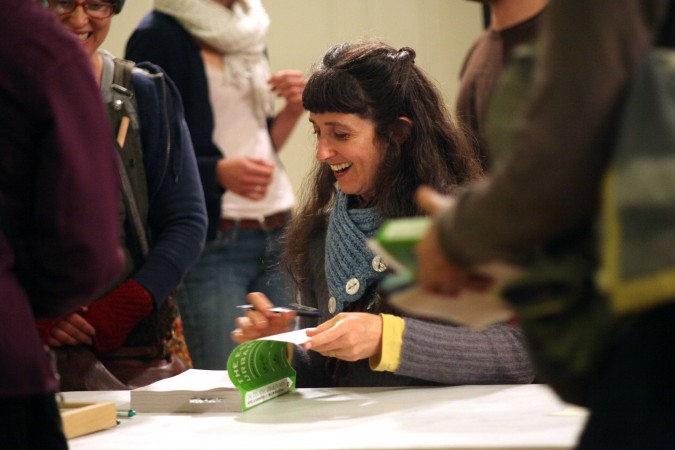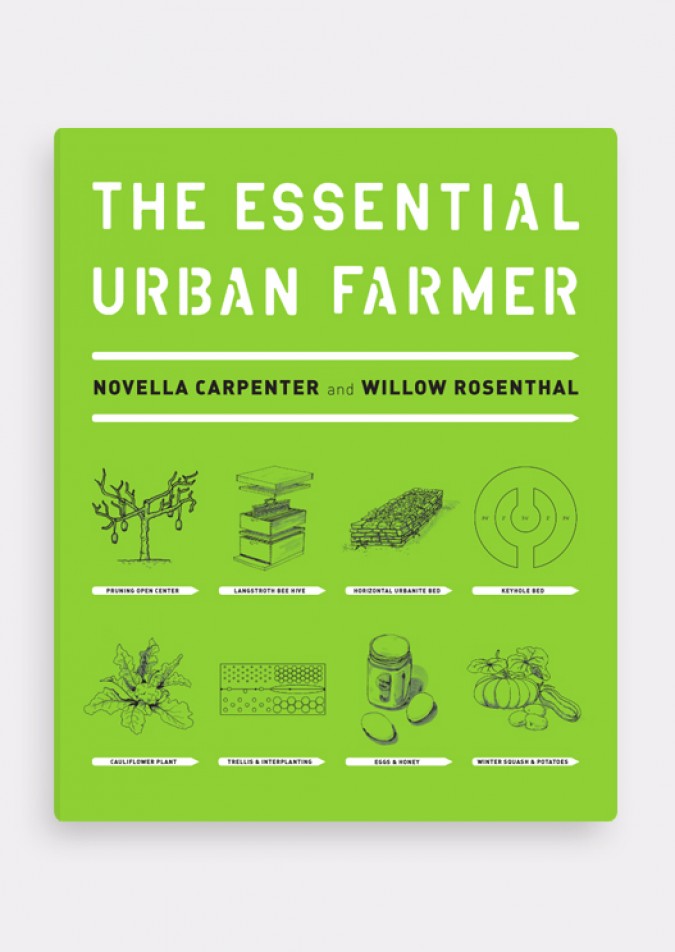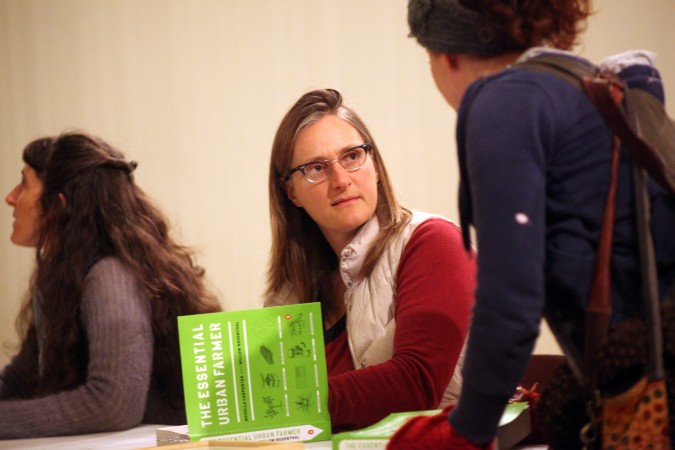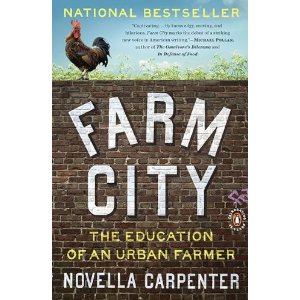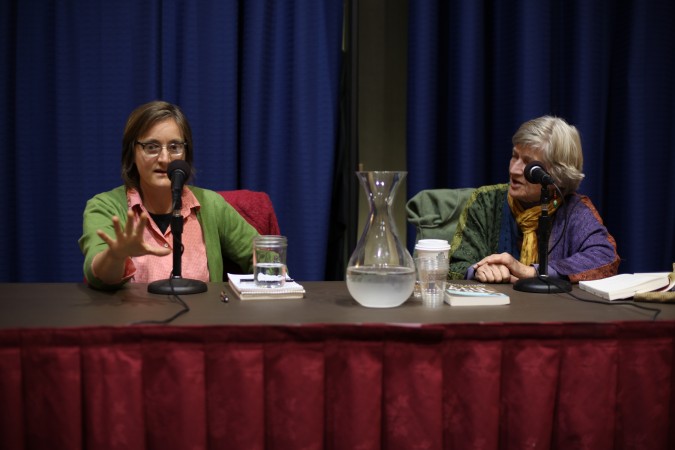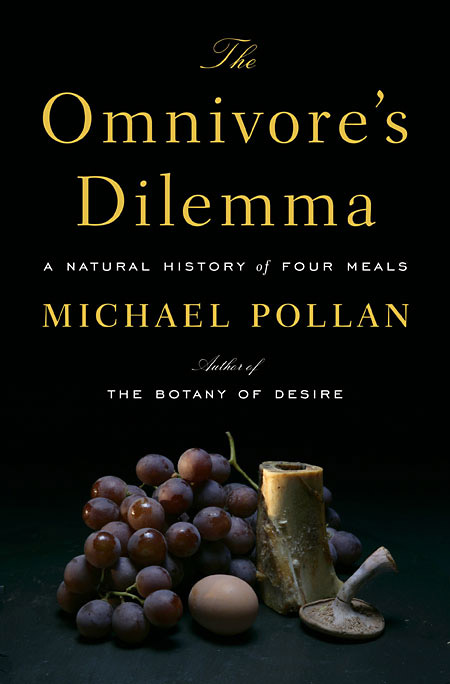Archive for the ‘Novella Carpenter’ tag
Novella Carpenter and Willow Rosenthal discuss their new book entitled The Essential Urban Farmer
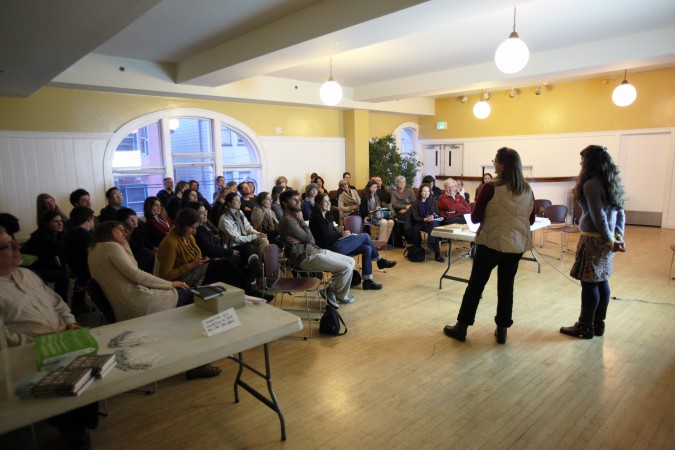
The Essential Urban Farmer book introduction 'Meetup' event February 29 2012, San Francisco, California
One of my favorite authors, Novella Carpenter, has a new book out. It was released December 27, 2011 by The Penguin Press.
Novella Carpenter and her friend Willow Rosenthal wrote The Essential Urban Farmer. This detailed how-to guide for individuals with or without farming experience looks destined to become a classic on the subject of urban farming.
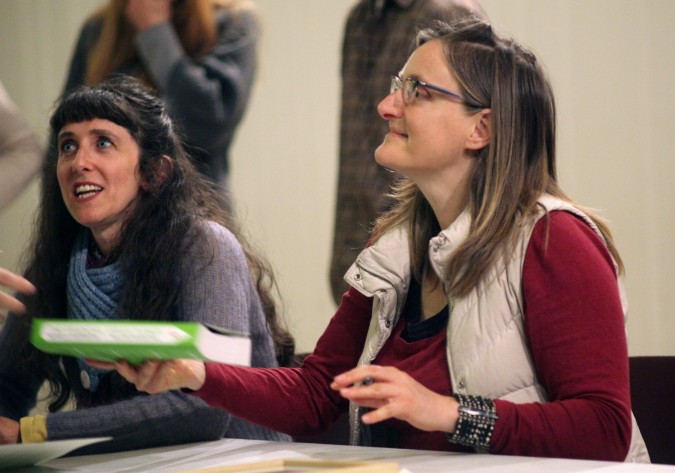
Willow Rosentha and Novella Carpenter February 29 2012 signing their book The Essential Urban Farmer
At 592 pages, Carpenter joked that the book is so heavy you can use it as a doorstop if needed.
Rosenthal and Carpenter gave a one hour talk this evening, February 29, 2012, at The Women’s Building at 3543 18th Street, No. 8, San Francisco, California 94110 USA. I was familiar with most of what Rosenthal and Carpenter spoke about. Nonetheless, it was fantastic to see them speak and answer audience questions.
Willow Rosenthal founded City Slicker Farms in Oakland, California USA, near San Francisco.
Novella Carpenter began her part of the talk with her infant baby girl nursing from a sling around her shoulder. I had been planning to capture video of her remarks, but I decided that was inappropriate with her baby feeding. After several minutes of talking, she asked a friend to take care of her baby, as I suspect it was just too distracting trying to address a room full of people and feed her baby simultaneously. Carpenter joked that at The Women’s Building the women all sit around breast feeding babies all day.
By that point, I recognized the light was too dim and the conditions too contrasty for a video to be any good. Carpenter was standing in front of a brightly lit video screen, so her face was dark. I decided to skip the video, except for a short clip I shot from the doorway to the room, showing Carpenter, Rosenthal and the audience together, with Carpenter answering a question about bee keeping.
Rosenthal and Carpenter spent three years writing this book so they could each reduce the perpetual effort they were exerting answering the same questions from their fans. Presumably they now can respond to emails seeking urban farming how-to information by saying “read the manual.” It’s a neat trick they’ll make some money along the way. I very much admire that Willow Rosenthal and Novella Carpenter have created. Learning to become self sustaining is valuable, and I predict this book will do well commercially and will expand the networks of Carpenter and Rosenthal dramatically. The audience for this book strikes me as different from the audience for Carpenter’s first book, Farm City, which was her delightful and captivating story, not a how-to guide.
As far as I can tell, The Essential Urban Farmer is Rosenthal’s first published book.
The Essential Urban Farmer covers growing vegetables, fruit trees, rabbits, ducks, chickens and goats. It also covers bee keeping.
The guide has lists of vendors for supplies and information. It turns out there are sellers of bee keeping supplies right in San Francisco. I learned that San Francisco is a great place to keep bees because there are so many types of vegetation here, more so than on a farm in the country, where large expanses of single crops are more common. I learned that bees can and are willing to fly five miles each way to put in their days’ work.
They don’t call them ‘worker bees’ for nothing.
I would be exhausted if I had to walk five miles each way to work each day.
Something tells me bees work 365 days a year. Maybe that’s why colonies are collapsing. I sure would if I tried to work that much. I’m making a joke here, of course. Colony Collapse Disorder looks to be a dramatically serious problem.
I came away with an idea for my super green eco bus conversion project. Fruit trees can be trained to be mostly two dimensional. This is done so trees can hug the sides of houses and fences, to save space. But it means I might be able to grow a dwarf apple tree behind my sofa on my coach with the flat side of the tree parallel to the window over the sofa. It would be crazy to be able to reach overhead and pluck an organic apple while reading The Essential Urban Farmer parked by the waterfront and warmed or cooled by the solar panels on the roof.
I told Rosenthal and Carpenter the short version of my plans for my eco vehicle, and they thought it was cool or they were great actors. I first met Novella Carpenter when she spoke at The Commonwealth Club of California January 25, 2011. Carpenter remembered meeting me back then, which was flattering.
Perhaps through the authors of The Essential Urban Farmer I will meet the adventurous souls I am seeking to take my eco bus on the road to spread the word about urban farming and homesteading.
The Essential Urban Farmer has three reviews on Amazon, and they are all five star ratings. Here is what reviewer Reckless Reader had to say:
“This book is the REAL DEAL — Novella and Willow are REAL urban farmers. You can read about it all in Novella’s Farm City, her memoir of taking a rasty vacant lot in funky ghetto West Oakland, California, and turning into a real urban farm — with vegetables, chickens, killer eggs, rabbits, and even, eventually a pig. That book made me wonder if I could really do this kind of thing out in my sprawling backyard. Even though I dont know jack-diddly, really, about how to farm. And you know what — this new book really tells how to do it, from how to pick land (near water, for instance, at least near a hose…), get the right to use the land, and then how to get the soil ready, how to get the right seeds, right through how to kill simple farm animals for food every now and then. It’s fun to read even if you dont want to go the length, but it seems like I am going to be able to do everything I want to do in my backyard, using just this one total REAL DEAL ‘how to’ guide to it all. Wow!”
I took the photographs above at the book signing Rosenthal and Carpenter conducted after their remarks.
I shot these pictures with my Canon 5D Mark II camera set at ISO 5,000. The lighting conditions were poor, and I needed all the light sensitivity I could get. I am pleased with the quality of the images considering how dark it was in that hall. I uploaded the pictures at full resolution. Click on them to see them at their full 21 megapixel resolution.
Janet Hansen designed the cover for The Essential Urban Farmer. I got the photograph of the book from Hansen’s website, which is worth visiting, as she’s a very talented designer.
Oakland, California tells Novella Carpenter she needs a permit to sell produce she grows at home
One of my heroes is Novella Carpenter, author of Farm City: The Education of an Urban Farmer.
Carpenter inspired me to start my own urban homestead in San Francisco, California, where I live.
Today Novella is getting significant press coverage because she got caught selling chard from her backyard garden. Here are links to a selection of the stories, which have generated hundreds of user comments hours after publication:
- Oakland gardener questions need for permit to sell produce
- Popular produce stand in West Oakland shuttered until farmer sorts out permit issue with city of Oakland
- City of Oakland fines urban homesteading author Novella Carpenter
- Yep, Novella Carpenter still needs a permit if she wants to sell produce from her garden
- Iconic urban farmer Novella Carpenter
- Oakland cracks down on Novella
I’ve met Carpenter at the Commonwealth Club of California, after I saw her speak there January 25, 2011.
Oakland, California is demanding Carpenter acquire a permit to sell products from her homestead. Apparently such permits cost a few thousand dollars.
Since Carpenter is famous and has zillions of supporters, I suspect she’ll come through this experience just fine. A permit costs money, but she can raise the money from her fans and then be compliant with the rules. The result will be more visitors to her vegetable stand because she’s getting a ton of great press right now.
I learned from the press coverage she’s now receiving that she paid just $30,000 for the vacant lot behind her apartment that she had been squatting on until recently. She received this favorable price because the owner wanted her to own the land. Doing this probably made the past owner feel good, and gave her some bragging rights that she enabled Carpenter to really get serious about her urban homestead.
I admire it when people get famous by doing something interesting and passionately writing about it.
In case you missed my post from January 25, 2011, here’s a clip of Carpenter speaking at the Commonwealth Club of California:
Carpenter teaches homesteading classes, including on how to raise dairy goats. I plan to take that one as soon as it’s offered again.
I met Novella Carpenter this evening at The Commonwealth Club of California
As I promised last month I attended this evening the talk called ‘Growing Food and Wisdom’ given by Novella Carpenter and Joan Gussow. This fascinating talk was held at The Commonwealth Club of California at their San Francisco office on Market Street.
Using the audience microphone I got to ask Carpenter where to start on my urban homestead household I’m now forming. Both Carpenter and Gussow gave detailed answers. Carpenter said to lay down a thick bed of animal manure based compost… several inches thick, before I begin planting. Gussow recommended not digging up everything in the yard, but advised just cutting it back down to the ground. Then she advised mulching with cardboard or commercial mulch and then digging through the mulch to do plantings in the essentially unturned soil. She said it would not be good to turn over the entire garden, as she said that would encourage lots of weeds to grow and cause a lot of needless work.
I am going to ask an audience microphone question at each event I attend at the Commonwealth Club from now on, as an amazing thing happened after the presentation. A nice woman started asking me about my urban homestead plans, and we got to talking. It turns out she’s looking to move and said she’d like to see the place to possibly move in herself. She has raised chickens and studied permaculture, and by her presence at tonight’s talk, it’s clear she has her heart in the right place for the crazy experiment I’m about to embark on. I hope she contacts me, as it seemed like a good fit. I have 2 remaining rooms, so there’s still hope if you’re interested in trying the urban farming life in the middle of a big, cosmopolitan city.
After the talk I introduced myself to Carpenter and told her of my desire to raise miniature dairy goats for milk. She said to start with chickens, as she said goats take more work. She pitched the goat raising class she teaches, which she said is full for now but will have slots next year, which is about when I predict I’ll be ready for goats. I am going to really try to get the aquaponics system and the chickens going this year, and that’s probably enough to get us started on the road to food self-sufficiency. I’m thrilled I will be able to take a class in goat raising from Carpenter herself for just $30. Sounds like the deal of next year.
I met some of Carpenter’s friends as well, including a nice woman who attends a writers workshop with her. It was inspiring to see Carpenter’s friends greet her, as I could tell they are extremely fond of her. In Farm City, one gathers she has great friends, and I confirmed that impression tonight.
I read Carpenter’s book Farm City last year, and it’s one of my favorite books. It was so heart warming and funny and inspiring. I told her that Farm City and Michael Pollan’s The Omnivore’s Dilemma are the two books that last year changed my life to my current super healthy eating habits, which I credit with my particularly good physical health and height appropriate weight. I weighed 25 pounds more a year ago than I do today, which was not overweight, but getting there. It turns out Carpenter and Pollan both studied together in college.
Farm City details Carpenter’s life in a gritty section of Oakland, California where she squatted her urban farm on a vacant lot behind her modest 2 bedroom apartment. The book ends with the lot being sold to a developer of condominiums, so her future was uncertain. Tonight I learned that the developer abandoned her development plans due to the real estate market collapse of 2008 and later decided she wanted Carpenter to own the lot. Carpenter told the developer she has little money, but the developer offered her a super low price to be paid in installments, and Carpenter now owns her city farm. She’s now having the concrete pad removed so she can get at the ‘real’ dirt below. The video excerpt I show below tells this lovely outcome much more colorfully than I’ve done here. I’ve decided to no longer post full videos of talks, as I feel it’s wrong to do so without explicit permission, and so far I’m scared to ask. Should I be scared to ask? I think it’s OK to post snippets, which will be how I handle talks I shoot video of going forward. This means I’m not going to post the rest of the Tim Ferriss video I promised when I wrote about his Commonwealth Club talk earlier this month.I’m sorry about this, but I’ve been feeling guilty. Some full length videos of high profile Commonwealth Club events are available on YouTube.com. I suggest that all Commonwealth Club events be captured on video and posted to YouTube. I think that this would help recruit members and increase attendance, as it’s so much more rewarding to attend than to watch online, primarily because you get to meet the speakers and shake their hands.
I introduced myself to Gussow as well, and I will soon read her latest book, entitled ‘Growing, Older.’ Yes, there is a comma between the two words in the title. She’s been advocating growing ones own food inside cities for decades, and she had many enchanting stories to tell, including how her friends and neighbors rebuilt her bowl shaped garden prone to becoming a lake over a dozen times per year due to it being on the Hudson River in Manhattan. The Hudson floods over a dozen times per year, which I did not know before this evening. Now the depression has been filled in with dozens of cubic yards of soil, so when the river floods, the water runs off quickly and doesn’t collect and stagnate, like before. Gussow is a teacher and advocate for green living, and I found her to be a wonderful presenter, with a warm and affectionate manner.
I had such a wonderful time this evening. I feel like I made some new friends and validated my plans to start a Carpenter style oasis in Forest Knolls, my hidden gem of a neighborhood in San Francisco.
